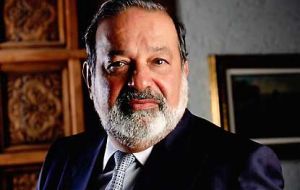MercoPress. South Atlantic News Agency
Latin America's richest man is worth 67.8 billion US dollars
 Carlos Slim Helu
Carlos Slim Helu Mexican telecom tycoon Carlos Slim, who is estimated by some calculations to be the world's richest man, said that he shook aside those comments and was more interested in making his business life compatible with his family and personal life.
"It's water off a duck's back to me" the cigar-smoking Slim was quoted in an Univision television conference for foreign correspondents. "I don't know if I'm No. 1, No. 20, or No. 2,000. It doesn't matter". The meeting was held at the seat of Grupo Financiero Inbursa, one of Slim's many companies and where he has his own art gallery with paintings from Diego Rivera, Jose Clemente Orozco, Van Gogh, Renoir and Rodin sculptures. In July, a journalist who tracks the fortunes of wealthy Mexicans said Slim was worth an estimated 67.8 billion US dollars and had overtaken Gates as the world's richest person. Slim jumped to the fist place following a recent surge in the share price of his America Movil, Latin America's largest cell phone company, according to Eduardo Garcia of the online financial publication Sentido Comun. Garcia said that made him close to 8.6 billion wealthier than Gates who's estimated worth was 59.2 billion US dollars. Forbes magazine reported in April that Slim had overtaken billionaire U.S. investor Warren Buffett for the No. 2 spot in the world's richest stakes, but it is not scheduled to recalculate Slim's wealth until next year. Slim, known for his Midas touch in turning struggling businesses into profit-making machines, is head of the Carso Group which has holdings from telecommunications to construction and restaurants, insisted that his greatest pride, above business and personal professional achievements, is "my family". Slim said he favored "evolution" instead of "revolution" (a sacred word in Mexican politics) because "it's too destructive" and suggested that the Mexican government should allow a greater participation of the private sector in the government owned Petroleos Mexicanos. The tycoon also mentioned that his charitable foundations planned to invest 300 million US dollars in the next few years to build 100 schools in poor regions of Mexico that will focus on digital education. The plan would later be expanded throughout Latin America he added.




Top Comments
Disclaimer & comment rulesCommenting for this story is now closed.
If you have a Facebook account, become a fan and comment on our Facebook Page!